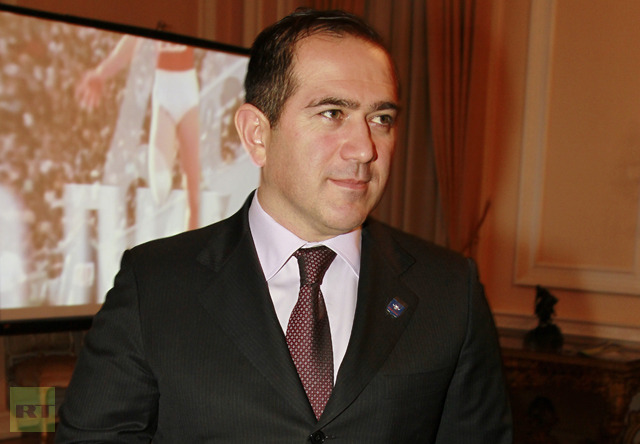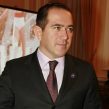
Kremlin Moves Closer to Abandoning North Caucasus Tourism Development Project
Publication: Eurasia Daily Monitor Volume: 10 Issue: 32
By:

On February 8, Russian Prime Minister Dmitry Medvedev held a government commission meeting in the city of Cherkessk, Karachaevo-Cherkessia on the socio-economic development of the North Caucasus. The commission called for investing additional funds—nearly $3 billion—through 2020 into the region’s agricultural development. Chechen leader Ramzan Kadyrov proposed a project for the de-mining of arable lands in the North Caucasus, principally in Chechnya, that would cost an estimated $300 million to $1.5 billion. The government meeting was more significant for what was not said. The idea of ski resorts was ignored throughout the meeting, even though it had earlier been touted as the primary economic project in the North Caucasus. The government commission for the socio-economic development of the North Caucasus had lost two of its prominent members after the previous session—Akhmed Bilalov, director of the Northern Caucasus Resorts Company, and Magomedsalam Magomedov, the former president of Dagestan (https://www.kommersant.ru/doc/2124648).
On February 6, President Vladimir Putin personally inspected preparations for the 2014 Winter Olympics in Sochi. During the inspection it was discovered that Akhmed Bilalov was responsible for building ski springboards for the Olympics, which were coming into being two years later than planned and construction costs of which increased from the original $40 million to $240 million. After this became known, Bilalov was fired from all the government positions he held, including director of the Northern Caucasus Resorts Company and vice president of the Russian Olympic Committee. A little known figure, Alexei Sadikov, was appointed as the acting head of the Northern Caucasus Resorts Company after Bilalov’s dismissal (https://www.gazeta.ru/business/2013/02/06/4955585.shtml).
Putin’s visit was widely broadcast on the Russian state TV channels, so his outrage at the mishandling of the resources in Sochi was probably staged and Bilalov had been predestined for firing some time ago. It is hardly news that prices for Olympic infrastructure rose and the speed of construction was much slower than expected. So there may have been other reasons behind Putin’s decision to fire Bilalov.
As paradoxical as it may sound, one possible reason may have been Bilalov’s relative success as an advocate for the economic development of the North Caucasus and for the region having a degree of independence from the Kremlin. As an ethnic Avar from Dagestan with very affluent relatives, Bilalov was well positioned to lobby Moscow for government investment in the North Caucasus, especially Dagestan. It is noteworthy that Bilalov’s dismissal came just days after Magomedov was replaced by another Kremlin candidate, Ramazan Abdulatipov, as Dagestan’s president. Thus it is plausible to suggest the almost simultaneous sackings of the two high-profile officials connected to Dagestan were not coincidental. In the past year, Moscow signaled several times that it was unwilling to invest the kind of financial resources in the North Caucasus as it once promised. The hundreds of billions of dollars pledged were replaced by modest injections of tens of millions of dollars for infrastructural upgrades. The Russian government’s change of tactics may also have required a change in personalities, and that is probably why Bilalov was eventually sacked. Moscow is now looking for a replacement for Bilalov, and some have even suggested that it could be Moscow’s envoy to the region, Alexander Khloponin (https://www.gazeta.ru/business/news/2013/02/15/n_2756325.shtml).
Before the Olympics in Sochi are over, Russia is still likely to pretend it has grandiose economic development projects for the North Caucasus in order to buy time and appease the regional elites. However, after the Olympics in 2014, Moscow’s plans for the region’s economic development are likely to experience a dramatic drop. It is likely that the Northern Caucasus Resort Company will either be gradually phased out or a Kremlin pick—most likely, an ethnic Russian—will be appointed to head the company.
It is unclear whether the development of tourism in the North Caucasus will remain a top Russian government priority. If not, what will be the next grand plan to provide each republic in the region with its own income-generating project? Khloponin’s role may now also be in limbo, since Moscow’s envoy was associated with the plans for the North Caucasus’ rapid economic development as the ultimate means of resolving the insurgency in the region. As these plans seem to crumble under the weight of plummeting government resources, it seems that the only avenues open to Moscow are using military force or instituting political reforms and opening up the region to the outside world. The remaining year before the Sochi Olympics and the year after the games are likely to be times of important decisions taken in Moscow. However, any big change in the North Caucasus will probably happen only after a major shakeup in the Russian leadership.




